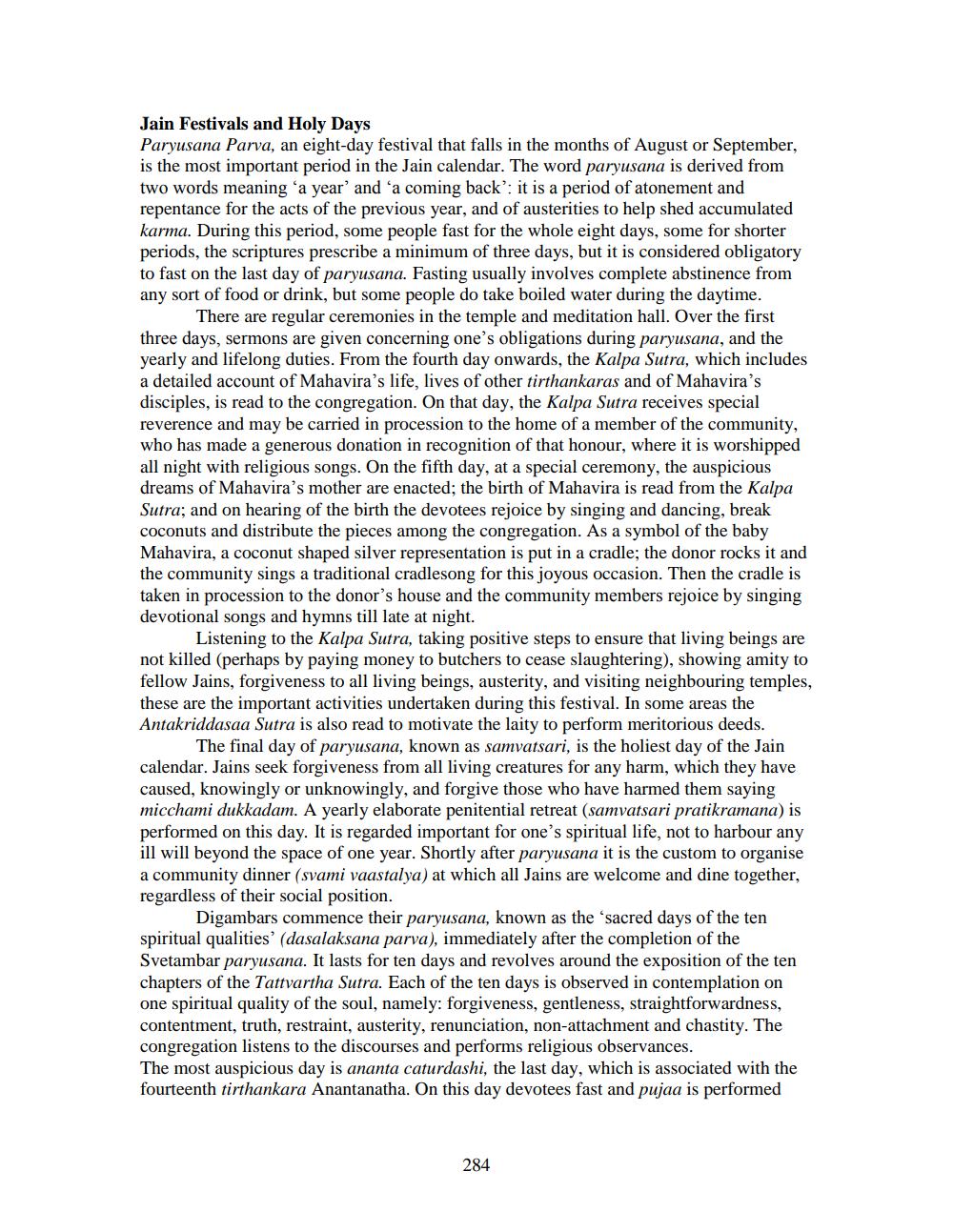________________
Jain Festivals and Holy Days
Paryusana Parva, an eight-day festival that falls in the months of August or September, is the most important period in the Jain calendar. The word paryusana is derived from two words meaning 'a year" and "a coming back': it is a period of atonement and repentance for the acts of the previous year, and of austerities to help shed accumulated karma. During this period, some people fast for the whole eight days, some for shorter periods, the scriptures prescribe a minimum of three days, but it is considered obligatory to fast on the last day of paryusana. Fasting usually involves complete abstinence from any sort of food or drink, but some people do take boiled water during the daytime.
There are regular ceremonies in the temple and meditation hall. Over the first three days, sermons are given concerning one's obligations during paryusana, and the yearly and lifelong duties. From the fourth day onwards, the Kalpa Sutra, which includes a detailed account of Mahavira's life, lives of other tirthankaras and of Mahavira's disciples, is read to the congregation. On that day, the Kalpa Sutra receives special reverence and may be carried in procession to the home of a member of the community, who has made a generous donation in recognition of that honour, where it is worshipped all night with religious songs. On the fifth day, at a special ceremony, the auspicious dreams of Mahavira's mother are enacted; the birth of Mahavira is read from the Kalpa Sutra, and on hearing of the birth the devotees rejoice by singing and dancing, break coconuts and distribute the pieces among the congregation. As a symbol of the baby Mahavira, a coconut shaped silver representation is put in a cradle; the donor rocks it and the community sings a traditional cradlesong for this joyous occasion. Then the cradle is taken in procession to the donor's house and the community members rejoice by singing devotional songs and hymns till late at night.
Listening to the Kalpa Sutra, taking positive steps to ensure that living beings are not killed (perhaps by paying money to butchers to cease slaughtering), showing amity to fellow Jains, forgiveness to all living beings, austerity, and visiting neighbouring temples, these are the important activities undertaken during this festival. In some areas the Antakriddasaa Sutra is also read to motivate the laity to perform meritorious deeds.
The final day of paryusana, known as samvatsari, is the holiest day of the Jain calendar. Jains seek forgiveness from all living creatures for any harm, which they have caused, knowingly or unknowingly, and forgive those who have harmed them saying micchami dukkadam. A yearly elaborate penitential retreat (samvatsari pratikramana) is performed on this day. It is regarded important for one's spiritual life, not to harbour any ill will beyond the space of one year. Shortly after paryusana it is the custom to organise a community dinner (svami vaastalya) at which all Jains are welcome and dine together, regardless of their social position.
Digambars commence their paryusana, known as the 'sacred days of the ten spiritual qualities' (dasalaksana parva), immediately after the completion of the Svetambar paryusana. It lasts for ten days and revolves around the exposition of the ten chapters of the Tattvartha Sutra. Each of the ten days is observed in contemplation on one spiritual quality of the soul, namely: forgiveness, gentleness, straightforwardness, contentment, truth, restraint, austerity, renunciation, non-attachment and chastity. The congregation listens to the discourses and performs religious observances.
The most auspicious day is ananta caturdashi, the last day, which is associated with the fourteenth tirthankara Anantanatha. On this day devotees fast and pujaa is performed
284




